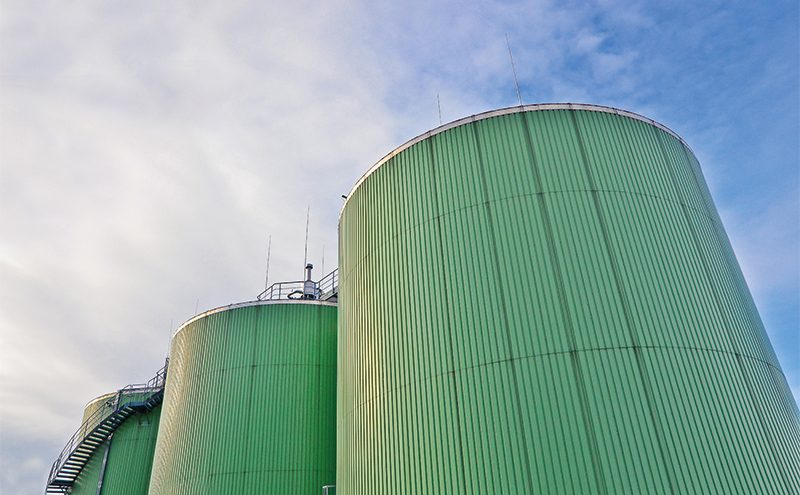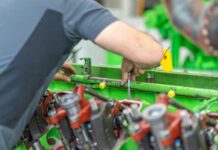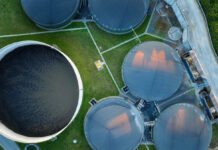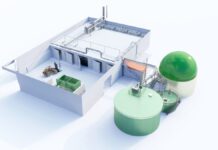 By Stephen McCulloch, UK business director, DMT Environmental Technology
By Stephen McCulloch, UK business director, DMT Environmental Technology
Upgrading biogas to biomethane, for injection into the gas grid or for use as a vehicle fuel, has long been touted as one of the most efficient uses of biogas – it boasts efficiency levels of almost 100 per cent, in comparison to just 40 per cent when the gas is converted into electrical energy. There are several methods available to upgrade biogas to biomethane of a natural gas quality. The first commercial plant to do so used water wash technology and in 2012, a new solution came onto the market: highly selective membrane technology.
While technological developments for upgrading biogas have continued apace, the progress of biomethane in the UK was halted just as production began to take off, primarily due to uncertainty over the incentive regime. Having originally been proposed by the Department for Business, Energy & Industrial Strategy (BEIS) back in December 2016, reforms to the Renewable Heat Incentive (RHI) were delayed due to the General Election and the ongoing Brexit negotiations, leaving the industry in a state of uncertainty for almost 18 months. However, there is now light at the end of the tunnel – these reforms have now been passed, providing additional financial support and certainty for developers of new biomethane-to-grid projects by resetting RHI tariff rates to June 2016 levels and offering tariff guarantees. As a result, industry insiders are predicting another surge in plant construction, following the first wave of activity that saw 90 UK biomethane facilities built in just five years.
RHI reforms – uplifted rates and guaranteed tariffs
From the date the new regulations came into force on 22 May 2018, RHI tariff rates for biomethane generation were increased. These rates are applicable to new schemes, as well as to applications for additional capacity. Payments made to small and medium biogas systems are divided into Tier 1 and Tier 2, while systems that produce biomethane are categorised as Tier 3, with their rates being reset to the levels of June 2016. The new tariffs are as follows:
• Tier 1 – 5.44p/kWh
• Tier 2 – 3.19p/kWh
• Tier 3 – 2.46p/kWh
Additionally, there was a tariff uplift offer available for biomethane installations with a registration date between 14 December 2016 and the date the new regulations came into force.
There is also a new mechanism for guaranteeing the tariff rate in advance of a plant commissioning, and before an application for RHI payment is made. However, the scheme rules that will apply are those at the date of registration; further detailed guidance will be published by Ofgem in due course. Guarantees are available for all capacities of biomethane, up to the injection of 250 GWh per annum, but to be eligible for a guaranteed tariff rate, an applicant must follow three stages:
• Stage 1: Provisional approval for a tariff guarantee
• Stage 2: Application for a full tariff guarantee
• Stage 3: Application for full registration
Upgrading options
The RHI reforms are expected to kickstart a second wave of activity in the UK biomethane market, which has already been the most successful sector of the anaerobic digestion (AD) and biogas industry over the past few years. Whereas biogas is only suitable for heat and electricity generation, once it is upgraded to a higher standard of purity, it can also be injected into the gas grid and used for the same purposes as natural gas. The upgrading process removes CO2 and any contaminants, thereby increasing the methane content. This upgraded biogas is called biomethane.
There are a number of different upgrading technologies on the market. The main solutions are:
• Water wash technology, which uses high pressure water to ’scrub’ impurities such as CO2, and H2S from raw biogas;
• Chemical wash, which uses absorber liquids such as glycol ethers or amines to remove the contaminants;
• Pressure swing adsorption (PSA), which uses adsorbent beds to remove impurities;
• Cryogenic upgrading, which involves compressing, cooling and then expanding the biogas until the CO2 is condensed and can then be removed as a liquid;
• And membrane technology, which uses gas permeation to separate CO2, O2 and H2 from CH4 and N2.
Advantages of membrane
All of these solutions are in use at biomethane facilities around the country, but in recent years, membrane technology has become the preferred upgrading solution for the majority of UK biomethane plants, largely due to its small footprint, low methane slip, minimal maintenance requirements and superior gas production. One efficient membrane solution on the market is the Carborex MS, supplied by DMT Environmental Technology. It is available in patented, modular units ranging from 40 Nm3 biogas/hr to 15,000 Nm3 biogas/hr (and higher), making DMT Environmental one of the few suppliers able to deliver the total range from small to large biogas upgrading installations worldwide.
With an efficiency of more than 99.5 per cent, the Carborex MS is a simple, easy to operate, plug and play system. It has a low energy consumption (0.22 kWh/Nm3 biogas) and requires no additional heat – in fact, it offers heat recovery of >0.25 kWt/Nm3 biogas, which covers the main energy consumption of an AD plant.
Guaranteed support and performance
Since constructing the world’s first commercial plant for upgrading biogas using a three-stage membrane system at Poundbury in Dorset, we have continued to improve our technology to be even more cost effective and efficient, to help operators reduce downtime and increase revenues. Over the past six years, we have installed over 30 systems worldwide, regularly achieving 98 per cent operational availability for our client base. Our membrane technology has produced a quarter of a billion cubic metres of biomethane globally, which is enough green gas to heat 227,000 homes and power thousands of vehicles.
Thanks in part to the RHI reforms, we see a robust future for the UK biomethane sector. As a result, as well as expanding the UK market, we are increasing the scope of our supply of membrane upgrading solutions. In addition, we are issuing a five-year membrane guarantee on our Carborex MS upgrading technology. Membrane technology is now a proven biogas upgrading solution. Already in use at the majority of UK biomethane plants, modern membrane systems such as the Carborex MS offer users a high quality, environmentally-friendly and flexible upgrading experience, compared to other traditional high-rise, complicated or energy-intensive techniques.








